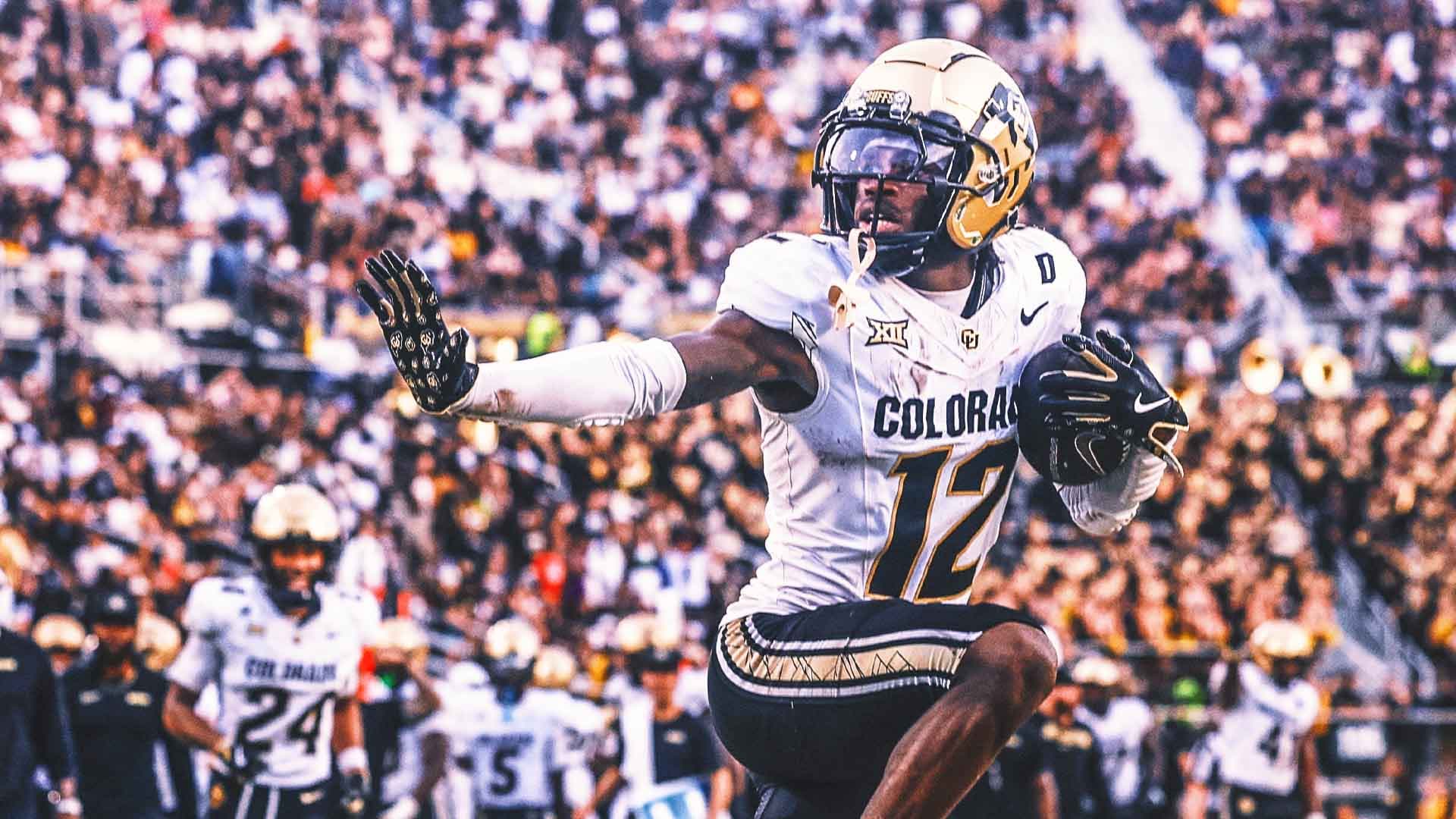-
Girlfriend serves only 2 years after fatally stabbing her boyfriend. Was it self-defense? - 11 mins ago
-
Remembering Pope Francis - 12 mins ago
-
Mets' Francisco Lindor knocks a lead off home run vs. Phillies - 16 mins ago
-
Gay Moms, Irish Catholics, and the Pope—a Story of Faith and Inclusion | Opinion - 20 mins ago
-
Arnold Schwarzenegger’s son turns heads with body transformation - 31 mins ago
-
Girlfriend serves only 2 years after fatally stabbing her boyfriend. Was it self-defense? - 54 mins ago
-
How to Watch the “Conclave” Movie Following the Death of Pope Francis - about 1 hour ago
-
Vikings 7-round mock draft: How should Minnesota build around J.J. McCarthy? - about 1 hour ago
-
Can Trump fire Federal Reserve Chair Jerome Powell? Here’s what to know. - about 1 hour ago
-
Dick Van Dyke gives rare comment about 46-year age gap with his wife - about 1 hour ago
What are the top 10 Heisman seasons of all time?
It obviously takes a special season to win the Heisman. It takes an even more incredible year, though, to be considered among the best of the best in the award’s near-100-year history.
Many Heisman winners have accomplished rare feats and set records in the year they took home the honor. For instance, in 2024, a two-way player who virtually played all of his team’s snaps from scrimmage won the award in one of the most memorable races in the history of the Heisman.
Was Travis Hunter’s victory among the best in Heisman history? Here are the 10 best Heisman seasons of all time, courtesy of FOX Sports Research.

Louisville has been far from a Heisman factory over its 100-plus seasons of football. Not only was Jackson’s win the first in program history, but it marked the first time since at least 1982 that Louisville had a Heisman finalist. Jackson’s play was good enough to put the Cardinals on the college football map that season. He threw for 3,390 yards, 30 touchdowns and nine interceptions to go with 1,538 rushing yards and 21 rushing touchdowns in 12 regular-season games. He had an eight-touchdown performance against Charlotte that year to go along with two seven-TD games.
But his most impressive performance came when he scored three total touchdowns against Clemson, nearly taking down that season’s national champion on the road. When you add all those things together, it’s no surprise that Jackson had -4000 odds to win the Heisman days before the ceremony.

9. Florida QB Tim Tebow (2007)
Tebow’s first season as a Heisman starter was one for the ages. After playing a bit role as a backup for the Gators in their title-winning season a year prior, Tebow instantly became one of the sport’s best quarterbacks. He threw for 3,132 yards, 29 touchdowns and six interceptions to go along with 838 rushing yards and 22 rushing touchdowns during the regular season. The rushing TD mark was the most ever in a single season in SEC history, while Tebow’s 9.4 yards per attempt was led the FBS that year. After a four-touchdown performance in Florida’s bowl game, Tebow finished the year with 55 total touchdowns, which also set an SEC record.
Tebow’s performance wasn’t enough to get Florida back to the title game — the Gators went 9-3 during the regular season. But it was enough for him to become the first sophomore to ever win the Heisman.

Long before he became one of the best running backs in NFL history, Allen dominated in the college game. His 1981 season remains one of the best ever for a running back. He rushed for 2,342 yards and 22 touchdowns that season, not including USC’s bowl game. If you add Allen’s rushing total from USC’s bowl win, his 2,427 rushing yards in 12 games would be the fifth-most in a season. He rushed for over 200 yards in USC’s wins over No. 2 Oklahoma and UCLA that season, marking two of the eight times that he rushed for over 200 yards in a game that season.

7. Texas A&M QB Johnny Manziel (2012)
A year after Texas A&M went 7-6, the Aggies went 11-2 in their first season in the SEC and were a title contender. Manziel’s insertion was a major reason for that, as he recorded one of the most electrifying seasons for a quarterback ever. He threw for 3,419 yards, 24 touchdowns and nine interceptions to go with 1,181 rushing yards and 19 rushing touchdowns in 12 regular-season games.
Manziel’s Heisman moment came late in the year, when he led Texas A&M to a 29-24 upset victory over No. 1 Alabama in Tuscaloosa. He threw for 253 yards and two touchdowns to go with 93 rushing yards against the team that went on to win its second straight title. After Manziel’s bowl performance, he led the SEC in rushing yards (1,410) and rushing touchdowns (21). That helped cement “Johnny Football’s” legendary season, as he became the first (redshirt) freshman to ever win the Heisman.

6. Pittsburgh RB Tony Dorsett (1976)
After finishing fourth in the Heisman vote in 1975, Dorsett made sure he took home college football’s top individual honor in 1976. He rushed for a national-best 1,948 yards and 21 touchdowns in 11 regular-season games, which also helped him set the all-time mark for most career rushing yards in NCAA history at the time. But his best performance that year isn’t included in that official stat line — rushing for 202 yards and a touchdown in Pittsburgh’s Sugar Bowl victory over Georgia. That win helped Pittsburgh win the national title, putting a cap on one of the best college football careers.

5. Michigan DB/WR Charles Woodson (1997)
Woodson had one of the most impressive all-around seasons in college football history in 1997, which helped Michigan win the title that year. The primary defensive back recorded seven interceptions, often shutting down the opposing team’s top receiver. Offensively, he had 231 receiving yards and three touchdowns.
Woodson’s most memorable play that season came as a returner, though. Six years after Desmond Howard had a punt return touchdown against Ohio State to cap his Heisman season, Woodson scored a 77-yard punt return touchdown against Michigan’s archrival. He wasn’t able to hit the Heisman pose as his teammates quickly tackled him. But Woodson took home the Heisman weeks later, defeating Peyton Manning in one of the closest votes in the award’s history.

4. Auburn QB Cam Newton (2010)
The case can be made that no one ever did more to help their team win a national title than Newton did in the 2010 season. After transferring from Florida, Newton quickly turned Auburn from a middle-of-the-pack SEC team to a championship contender. As Auburn won 11 games to open the season, it appeared it would lose against Alabama in its regular-season finale. Newton, however, scored four total touchdowns to help Auburn rally from a 24-0 deficit. Newton’s 408 total yards and six total touchdowns in the SEC Championship Game vs. South Carolina led to a more decisive win. He won the Heisman after that game and threw for two touchdowns in Alabama’s win over Oregon in the title game, capping the year with 2,854 passing yards, 30 passing touchdowns, seven interceptions, 1,473 rushing yards and 20 rushing touchdowns.

3. Colorado WR/DB Travis Hunter (2024)
In an era where quarterbacks of CFP teams typically win the award, it must take a non-quarterback to do something historic. Then consider beating out someone who rushed for the second-most yards in a season in college football history.
Hunter was able to do something incredibly unique in order to secure the Heisman this past December. The two-way star played the vast majority of Colorado’s snaps from scrimmage in 2024, recording 1,360 snaps before Colorado’s bowl game. Not only was Hunter durable, but he also put up elite production on both sides of the ball. He recorded 94 receptions for 1,258 yards and 15 touchdowns to go with a rushing score over the course of the season, including Colorado’s bowl game. Defensively, Hunter had 35 total tackles, 11 passes defended, four interceptions and a forced fumble. While those stats might not be eye-popping, quarterbacks didn’t throw Hunter’s way much. He allowed 22 receptions on 40 targets for just 212 yards and a touchdown, per Pro Football Focus.

Similar to Manziel, Burrow seemingly popped out of nowhere to win the Heisman in 2019. But Burrow’s season was statistically one of the best ever for a quarterback. Burrow punished LSU’s opponents through the air all season long, as he tallied 4,715 yards, 48 touchdowns and six interceptions to go with 289 rushing yards and three rushing touchdowns in the 13 games before the Heisman vote.
After winning the Heisman in the most decisive vote in the history of the award, Burrow arguably had his two best performances of the season. He threw for 12 touchdowns and rushed for two more in LSU’s semifinal and championship-game wins. Those performances gave Burrow 5,671 passing yards, 60 touchdown passes and 65 total touchdowns, setting NCAA records in the latter two stats.

Before he arguably became the best running back in NFL history, Sanders put up the best season ever for a Heisman winner. He rushed for 2,628 yards and 37 touchdowns in his final season at Stillwater, which remain NCAA records. He also did it while averaging 7.6 yards per carry.
Even more impressive about Sanders’ 1988 season is that he put up those numbers in just 11 games. At the time, the NCAA didn’t count stats from bowl games in its official records. Sanders rushed for 222 yards and five touchdowns in Oklahoma State’s bowl win that year, giving him 2,850 yards and 42 touchdowns on the season.
HONORABLE MENTION
USC RB OJ Simpson (1968)
Georgia RB Herschel Walker (1982)
Nebraska RB Mike Rozier (1983)
Boston College QB Doug Flutie (1984)
Michigan WR Desmond Howard (1991)
Florida QB Danny Wuerffel (1996)
Texas RB Ricky Williams (1998)
USC RB Reggie Bush (2005)
Baylor QB Robert Griffin III (2011)
Oklahoma QB Kyler Murray (2018)
Want great stories delivered right to your inbox? Create or log in to your FOX Sports account, follow leagues, teams and players to receive a personalized newsletter daily.
Get more from College Football Follow your favorites to get information about games, news and more
Source link























